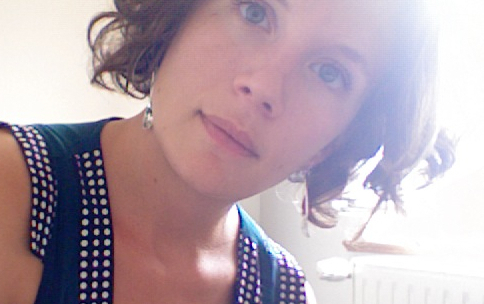Kathleen Heil
Edification
This is a story about three people I don’t know very well.
This is a story about two men who were involved with the same woman.
F. Scott Fitzgerald said: what people are ashamed of usually makes a good story.
1.
He showed her diagrams of the circular path his calculated mapping of the chaos generated and was surprised to see that she was interested. She wasn’t interested—not in the diagrams, anyway—but in his physicality. In the tooth that stuck out and twisted slightly to the left, the way hers did. And in the mole on the crest of his left hipbone. His whole body, really. He was a kouros with a big nose and the face of a very young Mick Jagger. She didn’t connect the Mick Jagger quality to the rest of it until about a month after she began seeing him. What was it. Sex personified. Seen in an exhibition on Andy Warhol, young Mick’s face recalled it and she thought:
OH.
2.
WHEREAS in a short story by a male writer
(n.b. she did not write Male Writers, she is deeply suspicious of ideology)
THERE WOULD here exist a long, rather florid description of the power of said lover’s sexual organ to excite the writer to near delirium, named by a grossly euphemistic noun and too many modifiers, but—
THIS WRITER will reflect on the goodness of h
SHE WILL WRITE he had a b
and leave it at that.
(The shortest distance between two points is always under construction.)
3.
They were sitting in her kitchen eating chirimoya. She would have liked to record the date, because she thinks that it was probably one year to the day that she had first tasted the fruit. She had been with the same man, the situation very different yet: — —-.
She can tell you about the weight of the fruit in her hand. Heavy. Like holding a human heart. Here is where she should confess that she has actually held a human heart in the hand and watched it die, because she is a thoracic surgeon, and such poetics happen in real life, just like in the movies.
(The last line, of course, is a lie.)
4.
This, however, isn’t: One man called her at the exact instant the other did, causing her cell phone to reject one and accept the other. Should she have taken that as a sign? Only in a movie. The director of the scene made sure that when she left her apartment to see her lost love, she ran. She was running. It was raining. This is what happened.
5.
In the kitchen. Chirimoya are big, green, dimpled fruit, about the size and weight of our collective and vague ideas about the human heart. He bought them because of the poem she had written after the first time they had sex and in that moment she had been smitten (yes, smitten), and on erotic overdrive, but that was before he broke her heart, the heartbreak came later, but all this has happened already and now they are just friends, but then there was this, that he wanted her now, now that she was with someone else, someone whom she would leave or who was thinking about leaving her, for various reasons. The shapes of their emotions, if they had taken shape and collected themselves into tiny histories, would have fit, perhaps, in the not-quite-tiny seeds inside the flesh of the fruit. He cut the fruit for her, enjoying the attention and adoration of her gaze, taking it in, but she knew even as he came to her that the coming was contingent upon her presence in his life as a kind of contingency, that there was nothing in his looking that asked of her anything, and as she looked at him and he came toward her she couldn’t shake her suspicions or her exhaustion or her ganas to be alone.
¿Hasta qué punto uno se puede desilusionar consigo mismo?
Are those even the right words, the right question?
And why in his language and not hers?
And yet today, in this, in sitting here, writing, she is content.
About what, she is not sure.
6.
The other man had the kind of face it was hard not to love. She somehow succeeded.
But she told herself she really did love him, even if she never fell in love with him.
He had a way of walking that seemed to mock the ego’s ambition to occupy space beyond the body. It was this lack of ego that she loved and the lack of space she felt ambivalent about. Which she desired and ignored. Which she would love and leave.
Would he ever forgive her? Oh, but the other man did.
She left one and the other one said: pues…
She said: ¿nada?
7.
She always tells the truth.
8.
Sometimes she lies.
9.
Sometimes life is the lie that tells the truth of the thing.

Kathleen Heil’s stories, poems, essays and translations have appeared in Chicago Review, Gigantic, Diagram, Michigan Quarterly Review, and elsewhere. Her website is kathleenheil.net.